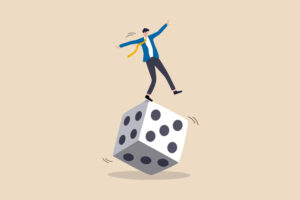Gambling can be fun, like playing games at an arcade or winning a small prize, but for some people, it becomes a problem. Gambling Disorder is when someone can’t stop gambling, even when it hurts their life. Let’s learn more about what this is, how to spot it, and how to get help.
What Is Gambling Disorder?
Gambling Disorder happens when someone keeps gambling even though it’s causing problems. They might lose money, struggle with friends or family, or even have trouble at school or work because of it. This condition is listed in a book that doctors use to understand mental health issues, called the DSM-5.
Signs of Gambling Disorder
Here are some common signs that someone might have a gambling problem:
- Always thinking about gambling: They might plan their next game or keep replaying past wins or losses in their head.
- Needing to gamble more: They bet more and more money to feel the same excitement.
- Can’t stop gambling: Even when they try to quit, they can’t.
- Feeling upset when not gambling: They get angry or restless if they can’t play.
- Chasing losses: If they lose money, they keep betting, hoping to win it back—but this usually makes things worse.
How Is Gambling Disorder Diagnosed?
A doctor or mental health expert will ask questions to figure out if someone has a gambling problem. They’ll look at things like how much time and money the person spends on gambling and if it’s hurting their life. Summary of DSM-5 Diagnostic Criteria for Gambling Disorder
Gambling disorder, as outlined in the DSM-5 (312.31; F63.0), is characterized by persistent and recurrent maladaptive gambling behaviour that leads to significant impairment or distress. Diagnosis requires meeting four or more criteria within a 12-month period, excluding behaviours better explained by a manic episode.
Inclusionary Criteria:
- Tolerance: Needing to gamble with increasing amounts of money to achieve excitement.
- Withdrawal: Restlessness or irritability when attempting to reduce or stop gambling.
- Failed Control: Repeated unsuccessful efforts to control or stop gambling.
- Preoccupation: Persistent thoughts about gambling, past experiences, or plans for future ventures.
- Gambling as Emotional Escape: Gambling when feeling distressed, such as anxious or depressed.
- Chasing Losses: Returning after losing money to try to recover losses.
- Deceptiveness: Lying to conceal the extent of gambling.
- Jeopardized Relationships/Opportunities: Losing or risking significant relationships or career opportunities due to gambling.
- Financial Dependence: Relying on others for money to alleviate gambling-related financial crises.
Specifiers:
- Episodic: Symptoms recur with symptom-free periods lasting several months.
- Persistent: Continuous symptoms lasting multiple years.
- Early Remission: No criteria met for 3 – 12 months after diagnosis.
- Sustained Remission: No criteria met for 12 months or more.
Severity Levels:
- Mild: Four to five criteria met.
- Moderate: Six to seven criteria met.
- Severe: Eight to nine criteria met.
This framework emphasizes both behavioural patterns and their impact on an individual’s life, enabling a comprehensive understanding and diagnosis of the disorder.
How Is Gambling Disorder Treated?
There are many ways to get help for Gambling Disorder. Treatment depends on what the person needs. Here are some options:
- Talking to a therapist: A type of psychotherapy called Cognitive Behavioural Therapy (CBT) helps people change how they think about gambling. It teaches healthier ways to handle stress or boredom.
- Joining a support group: Groups like Gamblers Anonymous let people share their stories and support each other.
- Medication: Doctors might give medication to help with mood swings or urges to gamble.
- Money advice: Talking to a financial counsellor can help someone make a plan to pay off debts and handle their money better.
How to Recover
Getting better is possible! Here’s what someone with a gambling problem can do:
- Ask for help: Admitting there’s a problem is the first step.
- Find supportive people: Talk to family, friends, or others who understand what you’re going through.
- Avoid triggers: Stay away from places, websites, or people that make you want to gamble.
- Take care of yourself: Try activities like sports, art, or hanging out with friends to feel good without gambling.
- Fix money habits: Set a budget, save money, and work on paying off any debts.
In conclusion, Gambling Disorder is serious, but it’s something people can overcome with help and determination. If you or someone you know might have a gambling problem, talk to a trusted adult or a counsellor. Remember, there’s always hope, and with support, anyone can regain control of their life. If gambling feels like it’s taking control of your life, we’re here to help – reach out today for support and take the first step toward a healthier future.
Author: Nenad Bakaj, MHumServ (RehabCouns), BSocWk, DipAppSci (Comm&HumServ), AMHSW, MAAC, MAASW, JP (Qld)
Nenad Bakaj is a Brisbane based Clinical Counsellor, Accredited Mental Health Social Worker, Life Coach and Bigger Bite Out Of Life Trainer with a keen interest in positive psychology, mental health and wellbeing, and is continually developing his professional skills and knowledge. Nenad enjoys working with adolescents and young adults, as well as older clients, and feels it is a privilege to be able to support them.
To make an appointment with Nenad Bakaj, try Online Booking. Alternatively, you can call Vision Psychology Brisbane on (07) 3088 5422 or M1 Psychology Loganholme on (07) 3067 9129.
References:
American Psychiatric Association (2013). Diagnostic and Statistical Manual of Mental Disorders (5th ed.). Arlington, VA: American Psychiatric Publishing.
Grant, J. E., & Chamberlain, S. R. (2016). Gambling disorder. The Lancet, 387(10027), 1008-1018.
Petry, N. M. (2017). Current and emerging medications for gambling disorder. Current Opinion in Psychiatry, 30(4), 266-274.
